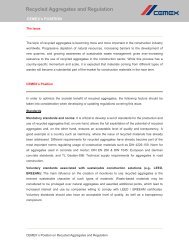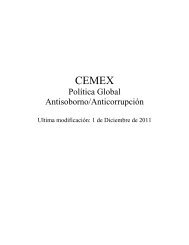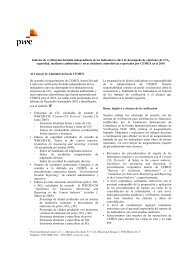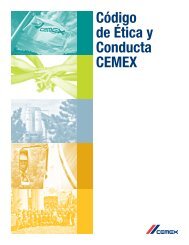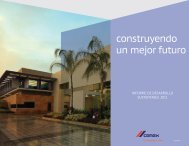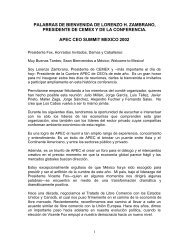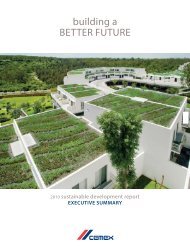building a STRONGER foundation - Cemex
building a STRONGER foundation - Cemex
building a STRONGER foundation - Cemex
You also want an ePaper? Increase the reach of your titles
YUMPU automatically turns print PDFs into web optimized ePapers that Google loves.
Our operations in South America, Central America and the Caribbean are faced with several risks that are more significant than<br />
in other countries. These risks include political instability and economic volatility. For example, on August 18, 2008, Venezuelan<br />
officials took physical control of the facilities of CEMEX Venezuela, S.A.C.A., or CEMEX Venezuela, following the issuance on<br />
May 27, 2008 of governmental decrees confirming the expropriation of all of CEMEX Venezuela’s assets, shares and business. The<br />
government of Venezuela has paid no compensation to the CEMEX affiliates, CEMEX Caracas Investments B.V. and CEMEX<br />
Caracas II Investments B.V. (together, “CEMEX Caracas”), which held a 75.7% interest in CEMEX Venezuela, or to any other<br />
former CEMEX Venezuela shareholder. On October 16, 2008, CEMEX Caracas filed a request for arbitration against the government<br />
of Venezuela before the International Centre for Settlement of Investment Disputes, or ICSID, pursuant to the bilateral investment<br />
treaty between the Netherlands and Venezuela, seeking relief for the expropriation of their interest in CEMEX Venezuela. The ICSID<br />
arbitral tribunal, or ICSID Tribunal, has been constituted, and the arbitration is now in the merits phase, the jurisdiction aspects having<br />
been concluded by the issuance of the award discussed below. We are unable at this preliminary stage to estimate the likely range of<br />
potential recovery (if any) or to determine what position the government of Venezuela will take in these proceedings, the nature of the<br />
award that may be issued by the ICSID Tribunal, and the difficulties of collection of any possible monetary award issued to CEMEX<br />
Caracas, among other matters. See “Item 4 — Information on the Company — Regulatory Matters and Legal Proceedings — Other<br />
Legal Proceedings — Expropriation of CEMEX Venezuela and ICSID Arbitration.”<br />
Our operations in Africa and the Middle East have experienced instability as a result of, among other things, civil unrest,<br />
extremism and the deterioration of general diplomatic relations in the region. There can be no assurance that political turbulence in<br />
Egypt, Libya and other countries in Africa and the Middle East will abate in the near future or that neighboring countries will not be<br />
drawn into conflicts or experience instability.<br />
In January 2011, protests and demonstrations demanding a regime change began taking place across Egypt, which resulted in<br />
former President Hosni Mubarak resigning from his post on February 11, 2011. Subsequently, Mr. Mubarak transferred government<br />
powers to the Egyptian Army. The Supreme Council of the Armed Forces of Egypt then issued a statement expressing a commitment<br />
to oversee an orderly transition of power by holding elections under a stable environment. Since then, demonstrations and protests<br />
have continued to take place across Egypt. Although CEMEX’s operations in Egypt have not been immune from disruptions resulting<br />
from the turbulence in Egypt, CEMEX continues with its cement production, dispatch and sales activities as of the date of this annual<br />
report. Risks to CEMEX’s operations in Egypt include a potential reduction in overall economic activity in Egypt, which could affect<br />
demand for <strong>building</strong> materials, and interruptions in services, such as banking, which could have a material adverse effect on our<br />
operations in Egypt.<br />
There have been terrorist attacks in countries in which we maintain operations, and ongoing threats of future terrorist attacks.<br />
There can be no assurance that there will not be other attacks or threats that will lead to an economic contraction or erection of<br />
material barriers to trade in any of our markets. An economic contraction in any of our major markets could affect domestic demand<br />
for cement and could have a material adverse effect on our operations.<br />
Our operations can be affected by adverse weather conditions.<br />
Construction activity, and thus demand for our products, decreases substantially during periods of cold weather, when it snows<br />
or when heavy or sustained rainfalls occur. Consequently, demand for our products is significantly lower during the winter in<br />
temperate countries and during the rainy season in tropical countries. Winter weather in our European and North American operations<br />
significantly reduces our first quarter sales volumes, and to a lesser extent our fourth quarter sales volumes. Sales volumes in these<br />
and similar markets generally increase during the second and third quarters because of normally better weather conditions. However,<br />
high levels of rainfall can adversely affect our operations during these periods as well. Such adverse weather conditions can adversely<br />
affect our results of operations and profitability if they occur with unusual intensity, during abnormal periods, or last longer than usual<br />
in our major markets, especially during peak construction periods.<br />
The Mexican tax consolidation regime may have an adverse effect on cash flow, financial condition and net income.<br />
During November 2009, the Mexican Congress approved a general tax reform, effective as of January 1, 2010. Specifically, the<br />
tax reform requires CEMEX, S.A.B. de C.V. to retroactively pay taxes (at current rates) on items in past years that were eliminated in<br />
consolidation or that reduced consolidated taxable income (“Additional Consolidation Taxes”). This tax reform will require CEMEX,<br />
S.A.B. de C.V. to pay taxes on certain previously exempt intercompany dividends, certain other special tax items, and operating losses<br />
generated by members of the consolidated tax group not recovered by the individual company generating such losses within the<br />
succeeding 10-year period, which may have an adverse effect on our cash flow, financial condition and net income. This tax reform<br />
also increases the statutory income tax rate from 28% to 30% for the years 2010 to 2012, 29% for 2013, and 28% for 2014 and future<br />
years. In 2010, we were required to pay, at the new 30% tax rate, 25% of Additional Consolidation Taxes resulting from eliminating<br />
the tax consolidation effects from 1999 to 2004. The remaining 75% is payable as follows: 25% in 2011, 20% in 2012, 15% in 2013<br />
and 15% in 2014.<br />
17



